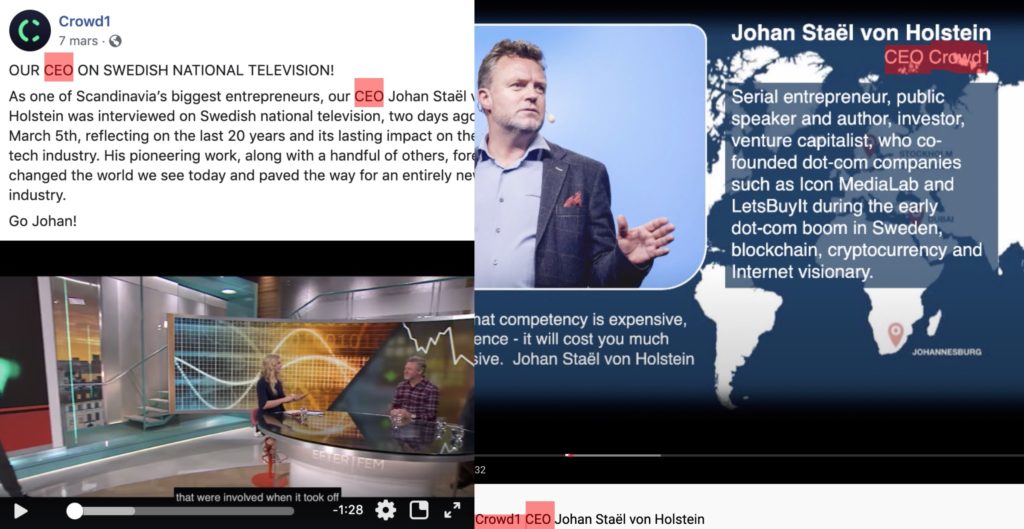Crowd1’s offer is as simple as it is tricky. For varying amounts – the cheapest membership costs €99, the most expensive €2499 – new members can start their “career” in the company.
For these sums, members receive both a training package and the opportunity to earn money from partnerships Crowd1 has with various affiliate companies in the online casino industry, i.e. companies that receive and pay money when they transfer people to gaming companies through advertisements.
In addition to this, members are attracted by promises of future income through the sale of other companies’ software.
Pyramid scheme or legal MLM?
Members can also make money when they recruit new members and these choose to buy their own packages or play on the online casinos Crowd1 collaborates with. This business model is called multi-level-marketing (MLM), or network marketing, and is used by big companies such as Herbalife and Mary Kay. However, in addition to membership acquisition, these companies offer actual products.

The question of whether Crowd1 sells products to customers other than its members is important. If a company has a direct sale of a product as its main purpose, it is, in most countries, considered legal MLM. If the company’s main business is the recruitment of new members that sends money up the chain, it is considered a pyramid scheme – something that is illegal in most countries.
Josefin Aronsson is an administrator at the Swedish Gaming Inspection and an expert on pyramid schemes. She believes that the line between pyramid schemes and legal MLM can be difficult to draw.
“The key issue is how the profits are made, whether it is primarily through the recruitment of new participants or through the sale of a product intended for an end customer”, she says to Trijo News.
She also believes that certain pyramid schemes may include the sale of products such as educational packages.
“In certain arrangements, in addition to the acquisition process, there is also the sale of a product. This can sometimes be called a start-up package, training package or be presented as an investment. In such a case, a participant sells training packages to new participants – which is the same as recruiting new participants. Such an arrangement is to be considered as a pyramid scheme”, she says.
Sussie, 49: I couldn’t get my money from Crowd1
Sussie Rosberg is 49 years old and works in healthcare. Before coming into contact with Crowd1, she had never thought of joining a network marketing company. But when a friend on Facebook contacted her about the company, she decided to buy in at the basic level.
“But I said I don’t want to recruit anyone, if this is crap, I don’t want to be responsible for it. After I talked about my investment with family members, I still got four people under me. For that, I would get €100, but I got no money. The person above me said they have had problems with their payment system”, she says.
Instead, she received her €100 by selling a so-called value check to another member with help from the person who recruited her.
Trijo News has also been in contact with two other persons who have had similar problems with getting money, other than in the cryptocurrency bitcoin, directly from Crowd1.
Do you think you will be able to make money on Crowd1?
“I’m a pessimist. I saw it as a game, if you win, you win. I generally think this kind of thing crashes, but I hope I’m wrong”, Sussie Rosberg answers.
ALSO READ: Mae-Za, 50, invested €6,400 in Crowd1 – was met with payout problems
Worked at a company that was sold to Onecoin
The most notable pyramid scheme globally in recent years is Onecoin. It was a company that promised its members riches in Onecoin’s own cryptocurrency if they bought expensive starter kits and recruited new members.
But Onecoin’s cryptocurrency wasn’t real, and the company’s central figures are currently under investigation in the United States for tricking its members to give up millions of dollars.
Onecoin, which has been the subject of a popular BBC documentary, plays a small role in Crowd1’s history.

The Swede Jonas Werner founded Crowd1 in 2019. But the company is not the first he, who according to himself has over 20 years of experience with MLM, held a leading position in.
At the beginning of the 2010’s, he was one of the central people in Synkronice-Springlo. This was a company that was accused by its own members of being a pyramid scheme after getting many, mainly young people, to invest the equivalent of $500 with a promise of big profits.
After Jonas Werner left the alleged pyramid scheme, he started working for another network within the same industry, Opn-Sitetalk. This company was also noticed in the media with dissatisfied members and pyramid scheme allegations. In 2016, the company became a part of Onecoin.

20 years of network sales have made Jonas Werner a wealthy man. He lives in a house on Värmdö outside of capital Stockholm with an approximate value of about $1.4 million and on his Facebook, he showcases a luxurious life.
Expensive lunches and lavish Christmas decorations are posted alongside advertising for Crowd1, which according to the founder has grown from zero to three million members in one year. Several pictures also show a certain Swedish IT pioneer.
Managed a company valued at over £480 million
Johan Staël von Holstein is the CEO of Crowd1’s parent company Impact Crowd Technology (ICT), but before joining that role in 2019, he was known as one of Sweden’s most renowned entrepreneurs.
His career began in the mid-1990s at the Kinnevik Group, where he worked under the legendary CEO Jan Stenbeck.
It was after this that Johan Staël von Holstein would create what he is still best known for: the consulting company Icon Medialab, a company with very big ambitions – which, during the peak of the dot-com bubble, was valued at over $480 million.

However, when the dot-com bubble burst, this also meant the beginning of the end for Icon Medialab, whose valuation fell by over 95 percent.
After this, Johan Staël von Holstein wrote columns in several of Sweden’s major newspapers. In addition to this, he started a new IT company.
Mycube was supposed to challenge Google in the search area and Facebook in social media, but the site’s launch was delayed and it all ended with Johan Staël von Holstein being fired as CEO of the company he himself had founded.
First said no to position as CEO
Since then, the internet guru has continued to be outspoken in the media, but has had no new major business ventures – until last year. Johan Staël von Holstein then became CEO of ICT, an offer he first declined.
“At first, I was not interested. I made it clear that it was crucial for me to have a parent company registered in a European country, where clear rules and regulations applied, so that the company would have to act fully compliant and transparent to avoid all the criticism that exists against companies in the industry”, the CEO writes in an e-mail to Trijo News.
Crowd1’s parent company was subsequently registered in Spain. Johan Staël von Holstein explains what it was that attracted him to the position as CEO.
“What was attractive was the enormous potential inherent in the business concept and the totally disruptive position it gives Crowd1 to, like Uber and Airbnb – which have no products of their own – offer the gig economy an opportunity to run their business via the platform,” the CEO responds.
However, Crowd1 offers no product besides the aforementioned educational material, either to its own members or to the end customer, Johan Staël von Holstein admits.
“Today it’s the education packages, seminars and events, our fantastic platform with all the services and opportunities it offers, but above all, it is the promise of the availability of a library of products to sell in the future. Before we have the sellers we will not get any products. We are in pre-launch where we are struggling with the ‘chicken or egg’ dilemma.”
Crowd1 has been banned in Namibia
While Johan Staël von Holstein and Jonas Werner are working on Crowd1’s “chicken or egg” dilemma, authorities in a few countries have had their eyes on the company.
The first of these is Norway’s Lottery Authority, which last autumn sent a letter to the company after being tipped off by several people who said it looked like a pyramid scheme, something the Norwegian news site E24 was first to report about.
The Lottery Authority does not want to decide whether Crowd1 is a pyramid scheme and thus violates the law. But in their letter, which is published on the authority’s website, it is noted that Crowd1 operates with a pyramid structure to generate revenue.

Crowd1 places a large part of its focus on growth in developing countries. Among other things, they are investing heavily in South Africa, where Johan Staël von Holstein, on behalf of Crowd1 and in front of large audiences, has held what can be likened to revival meetings.
But in South Africa’s neighboring country Namibia, things have been less good for Crowd1. There, the company has been banned by the country’s central bank, because of what they say is illegal activity. In the decision, the word pyramid scheme is never used straight out, but it is clear that this is exactly what the authority accuses Crowd1 of being, something that was first noticed in the South African edition of Business Insider.
“Crowd1 does not sell material products and does not provide any service of significant value. The primary source of income for Crowd1 is the sale of membership packages to new members. It is clear that the concept is not sustainable and will result in people, especially those at the bottom of the scheme, losing their money”, the decision states.
Namibia and Norway are not the only countries where authorities have noticed Crowd1. In the African country of Burundi, authorities launched an investigation against Crowd1 in January this year after arresting 17 people involved affiliated with the network, the African News Agency reports. However, it is unclear how this investigation went.
In Paraguay, the country’s financial supervisory authority has issued a warning regarding Crowd1. In addition, the company’s offer has been defined as an unregistered security, which means that people who market the company’s services can be fined or receive up to three years in prison.
Denies pyramid allegations
Johan Staël von Holstein denies that the Namibian authorities are accusing Crowd1 of being a pyramid scheme, and says that the arrests in Burundi happened because impasters started a company pretending to be Crowd1.
The CEO doesn’t think much of the attention of the authorities in both Namibia and Norway.
“Crowd1 exists in 170 countries and all countries have different laws and regulations. We have not been able to apply for a permit and familiarise ourselves with all the different local regulations. We are a startup that has grown very fast”, the CEO writes, among other things.
Do you run a pyramid scheme?
“Our ambition is to build a fantastic long-term and sustainable company in line with all the laws and regulations that exist in all countries where we will operate.”
Plays down his own role
When Trijo News in a follow-up email tells the CEO that several Swedish members have had trouble getting their money paid out in anything other than bitcoin, Johan Staël von Holstein suddenly begins to downplay his involvement in Crowd1.
“I have nothing or very little to do with Crowd1 and have no real insight into details like this”, he writes.

This despite being mentioned as Crowd1’s CEO in the company’s own material, something Johan Staël von Holstein explains like this:
“I don’t downplay my role in Crowd1. I don’t play a part in that company! I am the CEO of ICT who is taking over the brand, network and parts of the business from Crowd1.”
However, on ICT’s own website, Crowd1 is highlighted as part of the company’s offer, and on Crowd1’s website it appears that ICT is the parent company. Trijo News finds no information to prove that Crowd1 would not yet be part of ICT – except Johan Staël von Holstein’s own e-mails.
Blames delayed payments on the coronavirus
On the question of why money has not been paid out in currencies other than bitcoin, Johan Staël von Holstein, with several days delay, answers the following:
“Got the following answer: Yes, it is true that we have problems with our payments to bank accounts. This is because our banking partners have problems with payments outside the SEPA area. We still have bitcoin as a fully functional and good alternative for withdrawals.”
When Trijo News points out to the CEO that Sweden, the country where our sources are located, in fact, is part of the SEPA area, and therefore should not be affected by these problems, we get the following answer:
“I misunderstood your question which I thought was general. As for Sweden, they are now lagging behind with the payments due to half the company being sick in covid-19 for over a month, but they are catching up.”
However, according to Trijo News sources, the payout problems have existed long before the coronavirus outbreak. Johan Staël von Holstein has no explanation for this.
“No, I can’t answer that. The answer I got is that they are about to catch up”, the CEO writes.
Trijo News has, unsuccessfully, tried to reach Jonas Werner.





